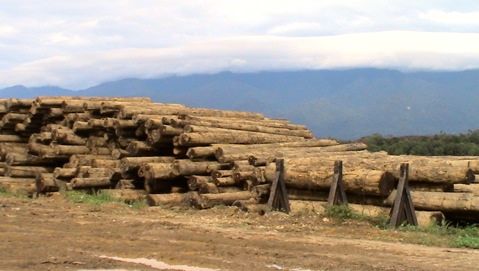 Komunitas adat di kampung-kampung pedalaman sekitar kawasan hutan di Distrik Wondiboi, Naikere dan Kuriwamesa, Kabupaten Teluk Wondama, masih trauma dengan peristiwa Wasior berdarah tahun 2001. Hingga hari ini, mereka belum bisa melupakan kejadian pembunuhan, penyiksaan, perampasan kemerdekan, perkosaan, penghilangan sacara paksa, pengungsian secara paksa, pembakaran rumah dan harta benda.
Komunitas adat di kampung-kampung pedalaman sekitar kawasan hutan di Distrik Wondiboi, Naikere dan Kuriwamesa, Kabupaten Teluk Wondama, masih trauma dengan peristiwa Wasior berdarah tahun 2001. Hingga hari ini, mereka belum bisa melupakan kejadian pembunuhan, penyiksaan, perampasan kemerdekan, perkosaan, penghilangan sacara paksa, pengungsian secara paksa, pembakaran rumah dan harta benda.
Dalam Laporan (2003) Tim Pengkajian Permasalahan HAM Papua dari Komnas HAM, menyimpulkan terdapat bukti permulaan yang cukup untuk menduga terjadinya pelanggaran hak asasi manusia yang berat dalam peristiwa Wasior dan berlangsung secara meluas, yang dikategorikan sebagai kejahatan terhadap kemanusiaan.
Peristiwa Wasior berdarah, bermula dari kehadiran perusahaan pembalakan kayu PT. Darma Mukti Persada (DMP) dan CV. Vatika Papuan Perkasa (VPP) yang beroperasi didaerah Naikere dan Wondiboi semenjak tahun 1992. Perusahaan mulai beroperasi tanpa ada restu masyarakat adat setempat lalu menggusur dan membongkar hutan, menebang pohon kayu dan mengangkut kekayaan hutan mereka keluar. Petugas Dinas Kehutanan Kabupaten Teluk Wondama, Bernad, yang ditemui pada kegiatan Dengar Keterangan Umum (DKU) Inkuiri Nasional Komnas HAM, (29/11), menceritakan “perusahaan PT. DMP beroperasi tanpa ada AMDAL, semua diurus pemerintah pusat, pemerintah Kecamatan Wasior ketika itu hanya menerima saja”, jelas Bernad.
Tahun 2009, ditengah gunjang ganjing tuntutan reformasi tata kelola pemerintahan, Kementerian Kehutanan mengeluarkan izin pembalakan kayu IUPHHK-HA kepada PT. Kurnia Tama Sejahtera (KTS) berdasarkan SK.648/Menhut-II/2009, lokasinya berada di eks PT. DMP dan dengan luas 115.800 hektar. Hutang masa lalu belum lunas terbayar, rehabilitasi dan keadilan bagi korban belum diselesaikan, pemerintah sudah mengeluarkan izin eksploitasi hasil hutan yang baru lagi dan menyulut banyak pertanyaan tentang keseriusan pemerintah untuk melindungi hak-hak masyarakat adat.
Pada DKU Inkuiri Komnas HAM di Jayapura, (29/11) korban Kostan Natama, tokoh masyarakat adat Mairasi dari Kampung Sararti, bersaksi “Pemerintah tidak menghargai dan tidak melindungi hak-hak kami. Pemerintah mengeluarkan izin tanpa konsultasi, demikian pula perusahaan PT. KTS tidak pernah berkonsultasi dengan masyarakat. Perusahaan katakan tidak akan melakukan penebangan di hutan milik masyarakat adat Mairasi di Kampung Sararti, Naikere. Nyatanya, PT. KTS membongkar hutan dan menebang kayu di Sarati secara tidak beraturan”, jelas Kostan Natama.
Masyarakat adat Mairasi di Wombu dan Sararti beberapa kali protes karena penggusuran tempat penting dan kecilnya uang kompensasi. PT. KTS bukannya menyelesaikan tuntutan masyarakat dan mengatur pembagian manfaat secara adil, sebaliknya perusahaan mengundang aparat kepolisian dan TNI yang berjaga-jaga di logpond dan basecamp perusahaan. Trauma kekerasan masa lalu membuat masyarakat tidak leluasa untuk mengadukan kejahatan perusahaan.
PT. KTS merupakan salah satu anak perusahaan dibawah Artha Graha Group, milik Tommy Winata (TW), berkantor pusat di Gedung Artha Graha Lt. 27, Jl. Jend. Sudirman Kav. 52-53, Jakarta. Perusahaan pembalakan kayu milik TW lainnya yang beroperasi di tanah Papua adalah PT. Papua Satya Kencana, (Nomor SK.647/Menhut-II/2009, tanggal 15 Oktober 2009), berlokasi di Kabupaten Teluk Bintuni dengan areal seluas 195.420 hektar.
Imperium bisnis TW membesar dan sangat terkenal dekat dengan kalangan militer. TW terlibat dalam pembangunan infrastruktur militer, pembangunan barak hingga penyaluran barang-barang ke markas TNI di Papua. Perusahaan bisnis TW bermitra dengan Yayasan Kartika Eka Paksi, milik angkatan darat, untuk membangun proyek raksasa SCBD (Sudirman Central Business District). TW dituding oleh pesaingnya memanfaatkan militer untuk memudahkan bisnisnya.
Akhir Januari 2013, sesuatu yang masyarakat tidak diharapkan dan dikhawatirkan terulang kembali. Aparat TNI yang bertugas di Logpond PT. KTS memukul Yulian Kiri dan berselang sehari beberapa petugas dari Basecamp datang ke logpond dan melakukan tindakan kekerasan serta penganiayaan terhadap Yulian hingga babak belur, bengkak dan muntah darah serta mengakibatkan gangguan pendengaran hingga hari ini.
Pada waktu yang sama, petugas TNI AD di KM 48 juga melakukan penganiayaan dan mengancam Elias Natama dan Absalom Natama hanya karena mereka memaksa untuk diantarkan dari logpond pulang ke kampung. Elias dihukum pushup 100 kali dan berdiri dibawah tiang bendera. Menurut keterangan Elias kepada Kostan Natama, “Komandan Regu, wakil komandan dan salah satu anggota TNI, masing-masing melakukan pemukulan lebih dari sembilan kali ke arah wajah, ulu hati dan tulang rusuk, serta dua kali dipukul dengan rotan besar ukuran stik bilyar. Petugas menyuruh menyelam dalam lumpur selama 30 menit”.
Elias dan Absalom Natama diancam ditembak mati karena mereka berdua dianggap memprovokasi masyarakat untuk menutup aktivitas perusahan PT. KTS. Kata aparat tersebut “Kalau perusahan tutup, kalian yang lebih dulu kami tembak mati dan kemudian warga di dua kampung (Sararti dan Wombu) akan di habiskan”, jelas Kostan Natama yang menceritakan kesaksian korban.
Masyarakat lapor peristiwa kekerasan tersebut, tetapi pemerintah daerah, MRP dan pihak Kepolisian tidak pernah bertindak dan membiarkan korban. Sebagaimana peristiwa kejahatan kemanusiaan Wasior berdarah, pelaku dan instansi yang bertanggung jawab belum pernah terjangkau hukum.
Hari ini, Pos TNI masih menduduki Kantor Distrik Naikere di Kampung Naikere, dipinggir lintasan jalan satu-satunya dari kampung ke Kota Wasior. Warga Wombu dan Sararti sangat resah melintasi Pos TNI yang dijaga aparat bersenjata. Mereka terpaksa secara sembunyi-sembunyi mengunjungi saudara dan anak-anaknya yang sekolah di Kampung Naikere, mereka terpaksa menunda pengobatan ke Pos Yandu. “Warga takut melintasi Pos TNI yang sering menanyakan dan mengawasi penduduk. Mereka kadang sembunyi-sembunyi untuk mengambil hasil di kebun dan hutan, takut pergi ke Posyandu”, ungkap Stevanus Marani, saksi korban.
Komunitas adat di daerah ini meminta pemerintah menutup aktivitas perusahaan KTS dan menarik aparat TNI dari kampung-kampung yang hanya membuat masyarakat resah dan merasa tidak aman. “Kami juga meminta pemerintah memulihkan dan merehabilitasi hak-hak korban kekerasan pada peristiwa Wasior 2001″, ungkap Yunus Surumi, saksi korban dari Wondiboi.
Sumber: Pusaka http://pusaka.or.id/seramnya-bisnis-pembalakan-kayu-arta-graha-di-teluk-wondama/
